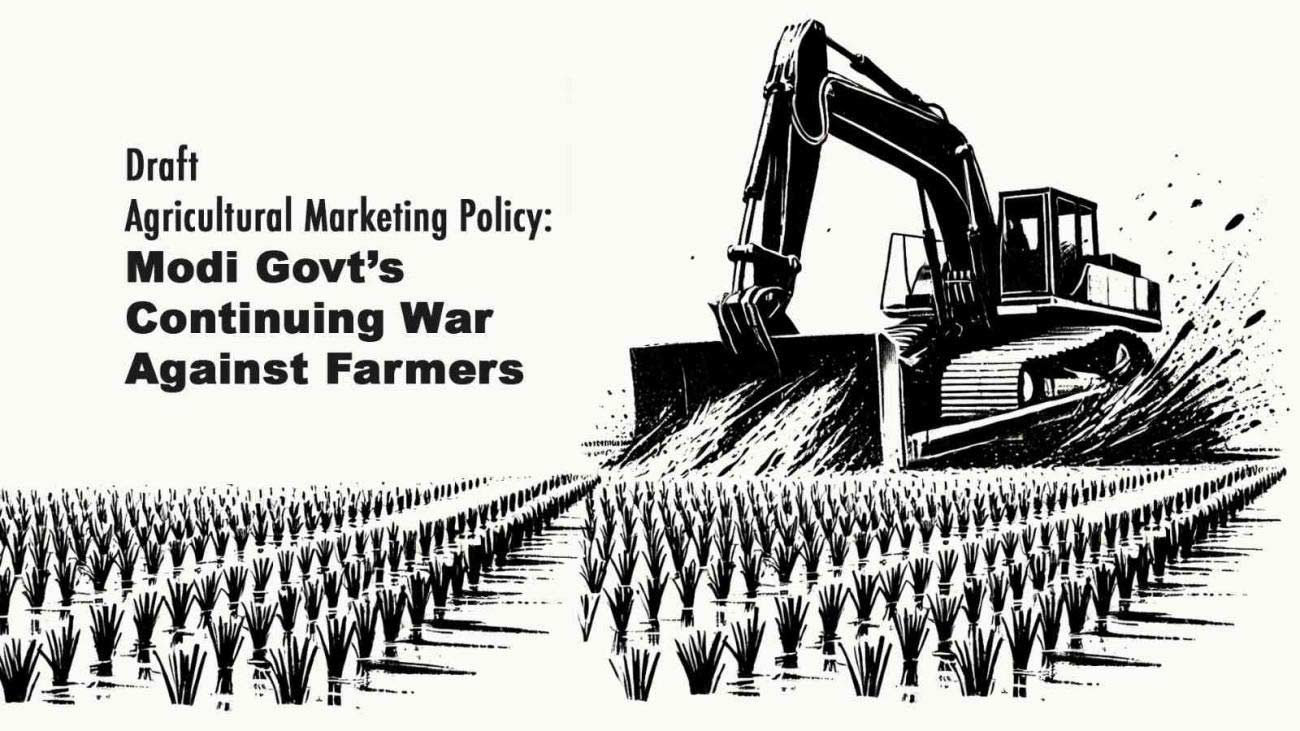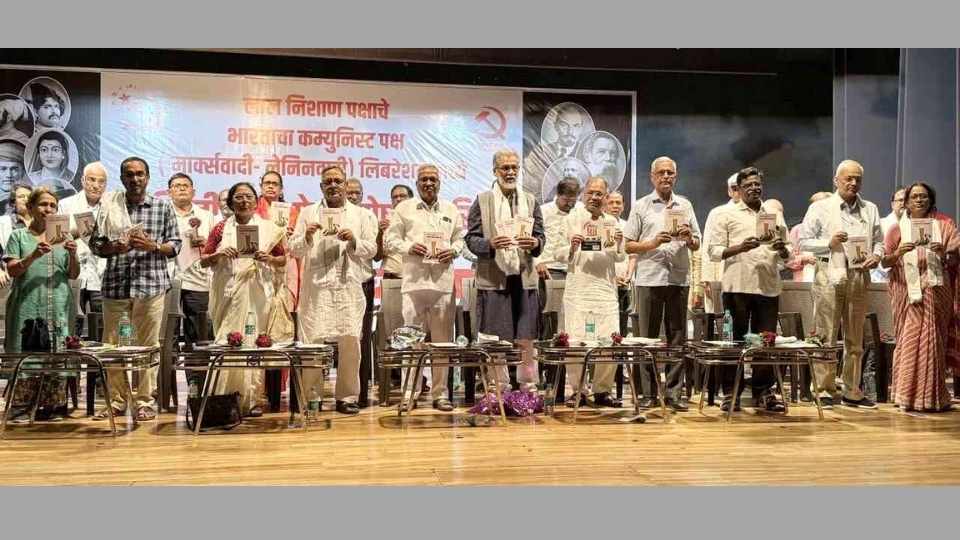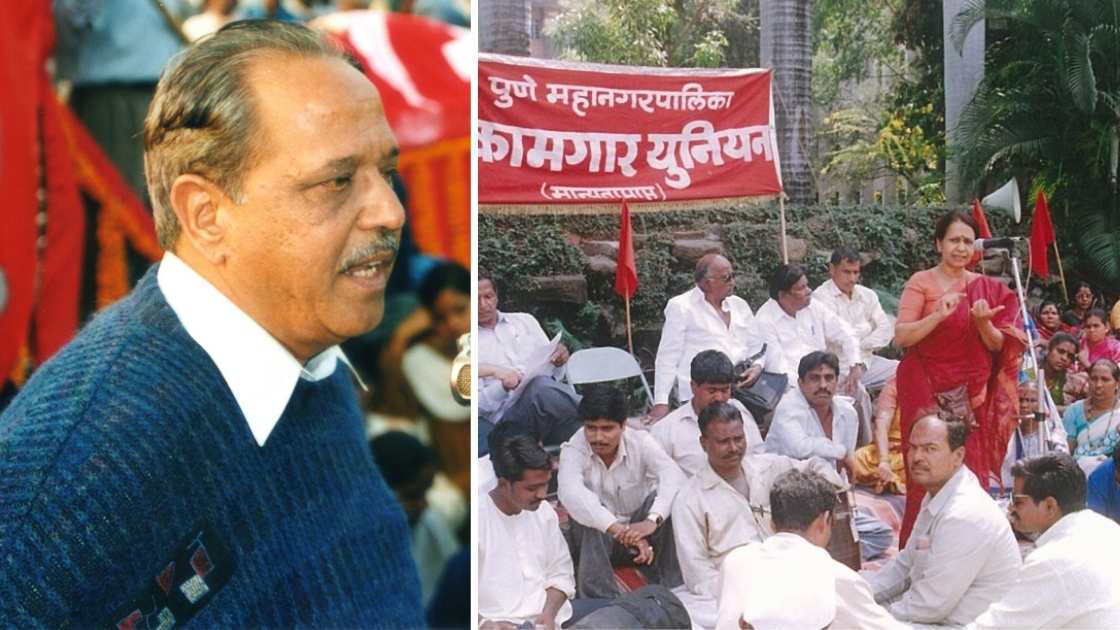The Draft National Policy Framework on New Agricultural Marketing, unveiled by the Modi regime on November 25, 2024, is another blueprint for disaster cloaked in the language of modernization and reform. Behind the technical jargon and lofty promises lies a calculated attempt to reintroduce the essence of the now-scrapped pro-corporate three farm laws through the backdoor.
The repeal of the three farm laws in 2021 was a historic victory for the farmers’ movement, achieved through a year-long struggle, in which more than 700 farmers were martyred. These laws—the Farmers’ Produce Trade and Commerce (Promotion and Facilitation) Act, 2020; the Farmers (Empowerment and Protection) Agreement on Price Assurance and Farm Services Act, 2020; and the Essential Commodities (Amendment) Act, 2020—were designed to enslave farmers under the corporates. The Modi regime, unable to deliver these farm laws to the corporates has taken a policy route to please them. The whole policy has been introduced as if nothing happened in 2021.
Purushottam Sharma, National Secretary of All India of Kisan Mahasabha (AIKM) said, “through this policy, the Modi government is pushing India’s agriculture into "market-driven production" rather than connecting it to the food security of its 140-crore population. This means that agriculture will cater more to market demands than the food requirements of the people.”
The framework emphasizes liberalized agricultural markets and promotes contract farming, private markets, and e-trading platforms. These measures mirror the core goals of the scrapped farm laws as shown in Table-1.
Private Players and Corporate Farming
The draft policy’s endorsement of contract farming (part of the "Agri-value chain”) and increase of private markets (both physical and e-markets) outside of APMC, with the focus on “ease of doing business”. While the government portrays it as a mechanism to ensure assured prices and market access, the ground reality is starkly different. Contract farming agreements are heavily skewed in favour of corporate entities, leaving farmers vulnerable to exploitation. Disputes over contract terms, delayed payments, and unilateral cancellations by corporations are well-documented issues that the draft policy conveniently ignores.
Contract farming has been sold as a lifeline to farmers, but it is a noose around their necks. Companies like PepsiCo have used contract farming to exploit small farmers, providing inadequate seeds, costly pesticides, and terms that leave them in perpetual debt. Once corporations control the market, they drive down prices and leave farmers with nothing. These experiences are not isolated incidents; they are the natural outcome of corporate control over agriculture.
The provisions of repealed Contract Farming Act and farmer producer organisations (FPO) as an instrument of integration of farmers with the national market, electronic and otherwise, are hailed as a measure of risk mitigation. This is a well-known fact that it is only the rich farmers and their corporate sponsors who can organise profitable FPOs. A large number small and marginal peasants and sharecroppers, who are already facing massive crisis and debt have no means to compete with corporate players in the market. They are bound to get more dependent and subjugated by the big capital which will further aggravate their crisis.
By promoting the "Agri-value chain" logic, the government is essentially turning farmers into cogs in a corporate-driven system. The value chain prioritizes efficiency and profits for agribusinesses while ignoring the environmental and social costs borne by farmers. Small farmers, lacking economies of scale, will find it impossible to compete, leading to a wave of landlessness and rural migration.
The APMC system, though not without its flaws, has provided farmers with a regulated marketplace and ensured some degree of price stability. The very reason for the problems concerning APMC is due to state neglect in favour of private players. The draft framework’s push for “competition” is a euphemism for dismantling this system. By promoting private markets and bypassing the APMC mandis, the government looks to reduce its own accountability while exposing farmers to the volatility of unregulated markets.
Private players, armed with capital and influence, will inevitably monopolize these markets, driving down prices and marginalizing small farmers. The elimination of APMC mandis in states like Bihar in 2006 has already shown the dangers of unregulated markets, where farmers are forced to sell their produce at exploitative rates to middlemen and corporate buyers. According to a 2019 study by the NITI Aayog, farmers in Bihar receive 20-30% lower prices for crops like maize and paddy compared to states with functional APMC systems. This policy framework threatens to replicate that failure on a national scale.
Moreover, the weakening of APMC mandis will undermine rural economies. These mandis not only provide farmers with market access but also serve as hubs of economic activity, supporting local businesses, transportation, and labourers. The dismantling of these institutions will have ripple effects, deepening rural distress and unemployment.
The government touts "freedom to choose the market" as a liberation for farmers, but this is a cruel deception. The agricultural produce of nearly 6% of farmers is procured by the government at MSP, while 94% of farmers are abandoned to the tyranny of the open market. Here, they are exploited by private entities who dictate prices, impose arbitrary quality checks, and deny farmers any recourse to justice. Government-regulated mandis, though limited in number, offer a semblance of fairness through auctions and collective bargaining. The open market, in contrast, is nothing but a feeding ground for corporate profiteers, where the farmer has no voice, no protection, and no power. The framework’s emphasis on e-trading platforms and digital marketplaces is being marketed as a step towards modernization. However, this so-called innovation does not address the ground realities of rural India. Limited internet connectivity, lack of digital literacy, and inadequate infrastructure make e-trading an inaccessible option for the vast majority of farmers.
Even in regions with better digital penetration, e-trading platforms have been criticized for their lack of transparency and accountability. Small farmers often find themselves at a disadvantage, unable to compete with larger players who have access to better resources and market intelligence. Moreover, e-trading platforms are likely to be dominated by large corporations and middlemen, replicating the same exploitative structures that exist in physical markets.
|
Table 1 : Backdoor Entry- Three Farm Laws and Draft Agri-Marketing Policy |
||
|
Aspect |
Three Farm Laws |
Draft Policy Framework |
|
Deregulation of APMC Markets |
Farmers’ Produce Trade and Commerce (Promotion and Facilitation) Act, 2020, Section 3: Allowed trading outside APMC mandis, bypassing state-regulated markets. |
Promotes private markets and direct buying outside APMC mandis, reducing their role in agricultural trade. |
|
Promotion of Private Markets |
Section 5 of the Trade and Commerce Act: Allowed private players to set up markets outside APMC jurisdiction. |
Encourages the creation of private markets and digital platforms for agricultural trade. |
|
Contract Farming |
Farmers (Empowerment and Protection) Agreement on Price Assurance and Farm Services Act, 2020, Section 7: Enabled contract farming with provisions favouring corporations in case of disputes. |
Pushes contract farming as part of the "Agri-value chain," with no robust safeguards for farmers. |
|
Dispute Resolution |
Section 13 of the Price Assurance Act: Excluded civil courts, creating biased dispute resolution mechanisms favouring corporations. |
Advocates arbitration-based grievance redressal, bypassing judicial processes for small farmers. |
|
Deregulation of Commodities |
Essential Commodities (Amendment) Act, 2020: Removed restrictions on stocking and trading of essential commodities. |
Focuses on private storage infrastructure, effectively deregulating the storage of key commodities. |
|
Absence of MSP Guarantee |
Farm laws did not mandate Minimum Support Price (MSP) for crops, leading to protests demanding a legal guarantee. |
No mention of MSP in the draft framework, despite being a key demand of farmers. |
|
E-Trading Platforms |
Section 8 of the Trade and Commerce Act: Enabled electronic trading platforms for agricultural produce. |
Promotes e-trading and digital marketplaces as alternatives to physical markets. |
|
Focus on Agri-Business Value Chain |
Laws promoted integration into global agribusiness supply chains. |
Strong focus on integrating farmers into "value chains" with corporate players leading the process. |
Missing MSP
One glaring omission in the draft policy is any commitment to MSP. The demand for a legal guarantee of MSP was at the heart of the farmers’ movement, and its exclusion from the policy framework underscores the government’s insincerity.
The current Minimum Support Price regime is more of a mirage than a guarantee for most farmers. While MSP is declared for 23 crops, the government procures only a select few, leaving farmers of other crops to sell at devastatingly low rates. The government’s failure to enforce MSP across all crops and regions is a deliberate abdication of its responsibility. This is particularly dangerous in a country where over half the population depends on agriculture for their livelihood. The volatility of market prices, coupled with the absence of a safety net, will push more farmers into debt and despair.
Farmers don’t need "freedom" from mandis; they need freedom from exploitation. They are demanding mandatory procurement at MSP—not as a favour, but as their right. Anything less is a betrayal of their labour and their lives.
Privatisation of Storage
The framework’s emphasis on privatizing storage infrastructure marks a decisive shift away from food security for people. By promoting private warehouses and cold storage facilities, the government is paving the way for corporations to control the flow of food grains in the market. This move not only undermines the FCI but also exposes the food supply chain to speculative hoarding and artificial price inflation.
Recent measures, such as reducing procurement levels, limiting storage capacities, and curbing financial allocations, indicate a deliberate attempt to weaken the institution. For instance, FCI's procurement of wheat in 2023 dropped to 25.2 million metric tonnes compared to 43.3 million metric tonnes in 2021, reflecting a significant decline. Storage capacities have also stagnated, with the FCI's covered storage capacity standing at around 36 million metric tonnes, insufficient to meet growing procurement needs, but the government has failed to improve the capacity or infrastructure.
“The implementation of this policy will be a step towards increasing the centralisation of power and solidifying corporate-fascist governance under the Modi administration. Farmers, traders, agricultural workers, and all those concerned about India’s democracy and constitution must unite to prevent this framework from becoming policy,” said Purushottam Sharma highlighting that India’s agriculture stays in the hands of those who toil on its soil.
This draft National Policy Framework is aware that country's "Farmers and agriculture struggle with 2Ms (Monsoon and Market)", but does not take measures accordingly as demanded by farmers' organisations.





